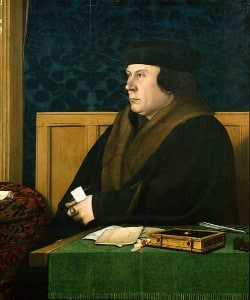
On this day in history, 28th July 1540, Thomas Cromwell, Earl of Essex and Henry VIII’s former right-hand man, was beheaded on Tower Hill. He had been arrested on 10th June 1540 at a council meeting, and a bill of attainder passed against him on 29th June 1540 for the crimes of corruption, heresy and treason.
After a speech in which he denied the charges against him and affirmed his faith in the resurrection and justification by faith alone, he knelt at the block and suffered an awful death at the hands of “a ragged and Boocherly miser, whiche very ungoodly perfourmed the office” (it took a number of blows to behead him). You can read all about his execution, and that of one of his clients, Walter, Lord Hungerford of Heytesbury, in my article 28 July 1540 – The Executions of Thomas Cromwell and Walter Hungerford.
Every time I write about Thomas Cromwell’s arrest or execution I receive comments here or on The AB Files Facebook page such as “Karma’s a bitch, Master Cromwell”, “he got everything he deserved…”, “what goes around comes around…” etc. and I will eat my hat if I don’t receive at least one like that today. Obviously some people hold him responsible for the fall of the Boleyns, which saw six innocent executed, and the dissolution of the monasteries, but does anyone deserve to die such a death? Really?
Personally, I don’t hold him responsible for either of those events, I lay the blame at Henry VIII’s door and see Cromwell as, in Diarmaid MacCulloch’s words, “Henry VIII’s enforcer” or Henry’s “fixer”. Cromwell’s fall was about humiliation and revenge, not a crime he had committed. Henry VIII was angry and humiliated – he’d been forced to marry a woman he wasn’t attracted to and he’d had to admit that he had been unable to consummate the union – and the Duke of Norfolk was seething over the dissolution of Thetford Priory, the resting place of his ancestors, and someone had to pay. Cromwell had risen too far in some people’s eyes and they were just waiting for him to make a mistake. He was vulnerable after the Cleves affair, so they attacked and turned the King against him. What a waste of a brilliant mind! Of course he was brutal and ruthless, and there is much to dislike about him, but he was not a monster and there is much to admire about his rise from his humble beginnings in Brewhouse Lane, Putney, where his family ran a brewery, to his position as Henry VIII’s chief adviser.
Thomas Cromwell is a fascinating character – he spent time serving as a mercenary in the French army, he worked for a financier in Florence, he learned the law and in his early 20s led a trip to Italy to see the Pope about the renewal of a guild’s licence for the sale of indulgences – he arranged a chance encounter with Pope Leo X and tempted him with English delicacies. The Pope had no problem granting the licence. Cromwell then went on to serve as a lawyer to Cardinal Wolsey and as a Member of Parliament, and it wasn’t long before he was spotted by the King. Cromwell played a major role in the break with Rome, persuading Parliament that it had the power to change the constitution and to get rid of the power of Rome. As Diarmaid MacCulloch explained in his documentary on Cromwell, Cromwell had given Parliament the power to intervene in the constitution and MacCulloch and this power has never been surrendered. The monarch now had to include Parliament in decision making, so this was where democracy started, with Cromwell being the King’s “fixer”. Wow, what a man! And that’s just giving you a taster of his career. You can read more about Cromwell’s rise and his incredible career in my precis of MacCulloch’s documentary – see Henry VIII’s Enforcer – The Rise and Fall of Thomas Cromwell.
So today I will be remembering Thomas Cromwell, Henry VIII’s “most faithful servant” and thinking “what a waste…”.
Trivia: Henry VIII came to regret Cromwell’s fall. Marillac, the French ambassador, reported in March 1541 that the King sometimes reproached his ministers “with Cromwell’s death, saying that, upon light pretexts, by false accusations, they made him put to death the most faithful servant he ever had.” (LP xvi. 590)
By the way, if you’re after a good book on Cromwell then I’d recommend John Schofield’s The Rise and Fall of Thomas Cromwell, it’s the best one I’ve read.